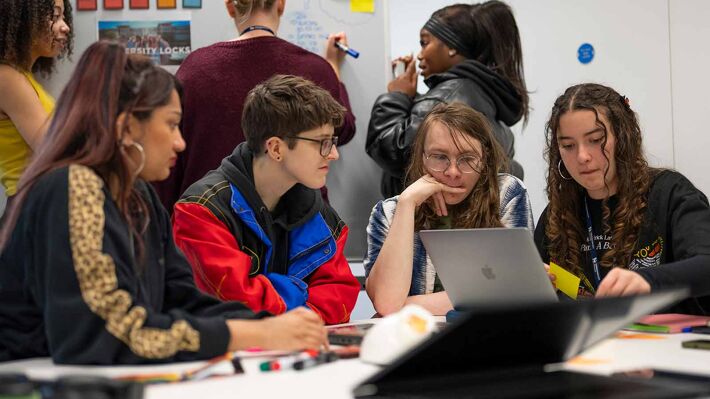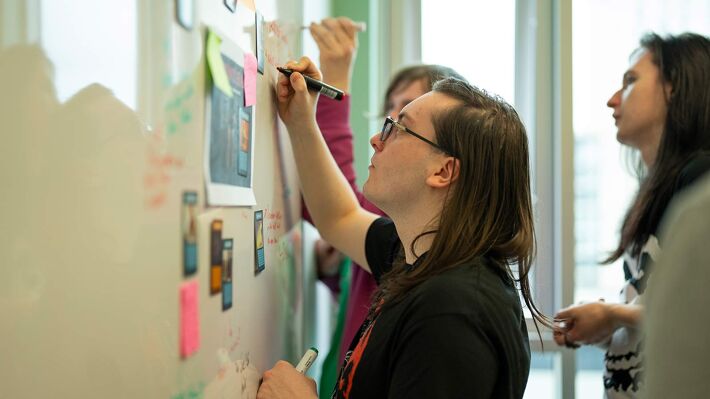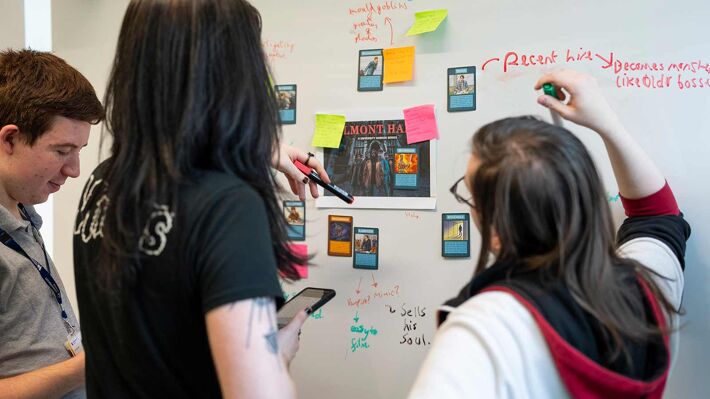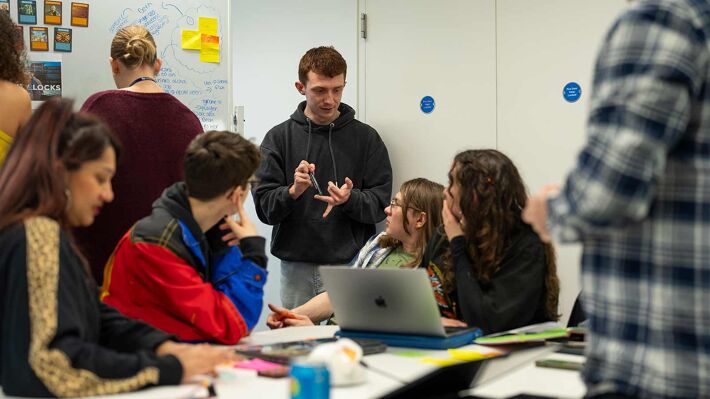Film and Screenwriting - BA (Hons)
Currently viewing course to start in 2026/27 Entry.
This cutting edge new BA (Hons) Film and Screenwriting degree course will develop your skills across key film studies and screenwriting debates and conventions. You will be taught by noted film scholars and established practitioners, who will provide their knowledge of international film and television screenwriting perspectives....
- Level Undergraduate
- Study mode Full Time
- Award BA (Hons)
- Start date September 2026
- Fees View course fees
- Subject
- Location City Centre
This course is:
Available with Professional Placement year
Open to International Students
Overview
This cutting edge new BA (Hons) Film and Screenwriting degree course will develop your skills across key film studies and screenwriting debates and conventions. You will be taught by noted film scholars and established practitioners, who will provide their knowledge of international film and television screenwriting perspectives.
The course is part of Birmingham City University’s Film Futures suite, designed to develop graduates with the theory, practice and industry trends that will enable them to succeed in a rapidly changing film environment.
What's covered in this course?
The course considers a wide range of script to screen traditions from theory, practice and industry perspectives.
You will gain an understanding of cinema and television conventions and screenwriting genres (such as romcom, thriller, science fiction and horror case studies). You will also be introduced to other international traditions that range from European cinema and television to smartphone filmmaking and beyond.
Focusing on the aesthetic and creative aspects of film and television screenwriting, you will consider storytelling, narratology and screen adaptation.
Modules such as Film Primer and Film Entrepreneurship provide core skills relevant to the film industry. You will have opportunities to work on established film festivals that are associated with the course and have access to film collections that will enrich your course of studies.
How you will learn
You will be taught in a range of lectures, seminars, writing workshops and production sessions, while regular film screenings help you contextualise cinema traditions against your own script creations.
Your formal studies will be enriched by the possibility to work on a range of external events, such as the Cine-Excess International Film Festival. This annual event attracts visiting international filmmakers, as well as hosting UK theatrical premieres on a regular basis. Having previously operated in London’s West End and Brighton, Cine-Excess has now relocated to BCU to operate as a central resource for the course.
Professional Placement year
This course offers an optional professional placement year. This allows you to spend a whole year with an employer, following successful completion of your second year, and is a great way to find out more about your chosen career. Some students even return to the same employers after completing their studies.
If you choose to pursue a placement year, you will need to find a suitable placement to complement your chosen area of study. You will be able to draw on the University’s extensive network of local, regional, and national employers, and the support of our Careers teams. If you are able to secure a placement, you can request to be transferred to the placement version of the course.
Please note that fees are payable during your placement year, equivalent to 20% of the total full-time course fee for that year.
I've already been given a lot of opportunities, including working on a documentary as a researcher and composer. This has given me an IMDB credit and my work is in a DVD which will be featured at various film festivals. The course leaders provide valuable insight into the film industry to ensure we're ready for the industry by the time we graduate.
Darryl Mcsporran
Why Choose Us?
- We’re ranked top 10 in the UK for Film Production and Photography for three consecutive years (Guardian League Table 2026, 2025 and 2024).
- The course combines theory, practice and industry approaches to film and screenwriting, alongside training in both documentary film techniques and film festival programming.
- You will be taught by noted film professors, cinema scholars and established screenwriters. Staff on the programme work together to ensure that you receive a balanced understanding of theory, practice and industry skilling relevant to the field.
- We have a partnership with BFI, which offers students free access to the BFI player and research, work placement and masterclass opportunities.
- You will have the opportunity to work on established film festivals that are associated with the BA. These include the annual Cine-Excess International Film Festival, which features visiting international filmmakers, UK theatrical premieres and industry mentoring sessions.
Open Days
Join us for our next Open Day where you'll be able to learn about this course in detail, chat to students, explore our campus and tour accommodation. Booking isn't open for the next event yet. Register your interest, and we'll let you know as soon as booking goes live.
Next Open Day: Friday 26 June
Entry Requirements
Essential requirements
Standard offer: 112 UCAS Tariff points. Learn more about UCAS Tariff points.
Accelerate offer: 80 UCAS Tariff points. Find out more about BCU Accelerate.
If you have a qualification that is not listed, please contact us.
Fees & How to Apply
UK students
Annual and modular tuition fees shown are applicable to the first year of study. The University reserves the right to increase fees for subsequent years of study in line with increases in inflation (capped at 5%) or to reflect changes in Government funding policies or changes agreed by Parliament. View fees for continuing students.
Award: BA (Hons)
Starting: Sep 2026
- Mode
- Duration
- Fees
- Full Time
- 3 years
- £9,535 in 2026/27 ✱ Important note for this price
- Apply via UCAS
(↩Back to price) * The Government is proposing to apply an inflationary increase to regulated tuition fees for 2026/27 and the University is planning on increasing fees to that maximum level once confirmed.
International students
Annual and modular tuition fees shown are applicable to the first year of study. The University reserves the right to increase fees for subsequent years of study in line with increases in inflation (capped at 5%) or to reflect changes in Government funding policies or changes agreed by Parliament. View fees for continuing students.
Award: BA (Hons)
Starting: Sep 2026
- Mode
- Duration
- Fees
- Full Time
- 3 years
- £18,570 in 2026/27
Guidance for UK students
UK students applying for most undergraduate degree courses in the UK will need to apply through UCAS.
The Universities and Colleges Admissions Service (UCAS) is a UK organisation responsible for managing applications to university and college.
Applying through UCAS
- Register with UCAS
- Login to UCAS and complete your details
- Select your course and write a personal statement
- Get a reference
- Pay your application fee and submit your application
Guidance for International students
There are three ways to apply:
1) Direct to the University
You will need to complete our International Application Form and Equal Opportunities Form, and submit them together with scan copies of your original academic transcripts and certificates.
2) Through a country representative
Our in-country representatives can help you make your application and apply for a visa. They can also offer advice on travel, living in the UK and studying abroad.
3) Through UCAS
If you are applying for an undergraduate degree or a Higher National Diploma (HND), you can apply through the UK’s Universities and Colleges Admissions Service (UCAS).
You can request a printed form from your school or nearest British Council office. You will be charged for applying through UCAS. Birmingham City University’s UCAS code is B25 BCITY.
Personal statement
The personal statement gives you a crucial opportunity to say why you’re applying and why the institution should accept you.
Here are the three areas you’ll need to address:
- Why do you want to study this course or subject?
Here’s where you explain what makes this course exciting to you. Think about your motivations for studying the course and your future plans. If you’re planning to take a year out, don't forget to give your reasons.
- How have your qualifications and studies helped you to prepare for this course or subject?
This is your chance to show what you’ve learned at school or college. You should include the skills and knowledge you’ve gained from education or training and how this will help you succeed in your chosen course.
- What else have you done to prepare outside of education, and why are these experiences useful?
Not everything you’ve learned comes from the classroom. Life experience counts too! You might want to talk about work experience, employment, or volunteering and how they’ve helped you develop the skills needed for your chosen course or future career.
Worried about Personal Statements?
If you've got no idea where to start or just want to check you're on the right track, we’ve got expert advice and real examples from our students to help you nail your personal statement. You can even download our ultimate personal statement guide for free.

Financial Support
We offer further information on possible undergraduate financial support. This includes the type of loans, grants and scholarships available both from the government and from Birmingham City University.
Course in Depth
Year one
In order to complete this course you must successfully complete all the following CORE modules (totalling 120 credits):
Screenwriting for Film Genres is aimed at emerging screenwriters. The course will focus on the popular, commercial end of the film industry market, paying particular attention to audiences and the demands and expectations of the marketplace.
This module provides an introductory course in film narrative and the principles of storytelling. The emphasis is on developing an understanding of narrative cinema. To do this the module will engage with theoretical models of storytelling and examples from narrative cinema.
This module looks beyond Hollywood and America to examine notable film movements from across the globe that influenced cinema on a worldwide scale and left an enduring legacy, continuing to shape contemporary filmmaking. The aim is to develop your appreciation of films rich cultural and social heritage, and the social drivers and rebellious characteristics of the filmmakers leading the charge. You will examine the social, political and artistic drivers behind key works, and the mastery and innovation that they display in pushing the boundaries of visual storytelling at their time of creation.
Screenwriting Primer will introduce you to the essential skills of, and principles behind, writing for the screen. You will study a number of freely available short guides to industry standard screenplay layout and formatting and apply that learning to the practical application of screenplay formatting software. You will create a portfolio of short screenplays, given as writing exercises through the learning schedule, and receive detailed formative feedback on the scripts, which you can use to improve and develop your work for your final portfolio. You will focus on visual storytelling, layout conventions, and be encouraged to identify the formal features of a screenplay in terms of character, genre, tone, plot and theme. You will also illustrate your understanding of elementary marketing principles.
Looking at forms in films, students will learn how visual languages are being used and how to compose shots that are translatable to other mediums such as animation. You will learn to storyboard and create effective animatics and to succinctly convey ideas and vision to produce short a film(s) as a group and individually. Expect to pitch your ideas individually and as a team.
Year two
In order to complete this course you must successfully complete all the following CORE modules (totalling 80 credits):
Writing for TV is designed to help students build on the fundamental skills of writing for the screen and direct that skillset to writing for the multi-format world of television. You will demonstrate an understanding of how to structure scripts for 30-minute and 1-hour slots, for drama series, sitcom, continuing and serial dramas, while presenting an adherence to industry-standard TV screenplay convention, and demonstrating expertise in the presentation of marketing documentation. You will also have the opportunity to reflect critically on your creative considerations.
This module is designed to help you develop the skills to read and evaluate scripts for the film and television industry. By the end of this course, you will have the skills and knowledge to assess and evaluate scripts according to industry standards. You will be able to read treatments, identify elements of a script, and write comprehensive script reports and 'coverage' that will be useful to film and television producers.
The module is an opportunity to learn and critically reflect on the skills of collaboration by enabling you to create an interdisciplinary project with students from complementary disciplines, or with academic staff. Collaboration is a vital employability skill within the Creative Industries and this module allows you to develop these skills, making use of University facilities and with the support of academic staff. Within this module framework, several kinds of collaborative opportunities are available. For example, with the approval of your supervisor, you can determine a project based on your own interests; your supervisor may set you a predetermined project to enable you to work with other students in a way that is appropriate to your subject area; or there may be opportunities for you to collaborate with staff on research projects. In all cases, you must apply your subject skills to an interdisciplinary project which will be agreed in advance with your supervisor.
In order to complete this course you must successfully complete at least 40 credits from the following indicative list of OPTIONAL modules.
This module introduces students to the creative and critical processes involved in translating narrative from one medium to another. It gives students the opportunity to apply their knowledge of dramatic theory and form through practical work, simultaneously encouraging the development of imaginative screenwriting skills in different genres. Through historical and genre-based case studies, it provides an introduction to ideological and formal questions in the study of adaptation.
This module will provide students with an overview of the cultural relevancy of 1970s cinema. Initially exploring the context of the decade and the fragmented nature of film narratives at the time the module will discuss the emergence and demise of ‘American New Wave/New Hollywood’ but also explore further the style, substance and aesthetics of the varying sub-genres of the time as well as the cultural and creative impact they had on both cinematic presentation and other aspects of the media industry.
This module will teach the skills needed to take a screenplay through to principal photography via the process of pre-production. To be an effective filmmaker, knowing how to turn the words on a page into reality so that you can shoot requires an essential wide range of skills. Starting with a screenplay, the students will be taught to first build their vision through mood boards / look books, sizzle reels, reference clips, casting ideals, costume & art dept plans before evolving this newly formed vision into things such as scheduling, budgeting, legals & compliance, location scouting, casting and managing a team of creatives. In essence, from theory to practical reality.
Core modules are guaranteed to run. Optional modules will vary from year to year and the published list is indicative only.
Year three
In order to complete this course you must successfully complete all the following CORE modules (totalling 80 credits):
This module critically evaluates horror narratives in their cultural, historical and generic contexts across both visual and audio traditions, and asks you to analyse how debates in this area impact on creative and production practices in the field.
The module is an opportunity to learn and critically reflect on the skills of collaboration and/or your own professional practice. The module enables you to create either an interdisciplinary project with students from complementary disciplines or your own self-defined project.
The purpose of the module is to enable you to undertake a sustained, in-depth and theoretically informed research project exploring an area that is of personal interest to you. It is important that we can support you appropriately, so you will be guided towards choosing a research topic which is relevant to your discipline and in which your lecturers have expertise. The outcome may take the form of a written dissertation or a practice-based portfolio.
Core modules are guaranteed to run. Optional modules will vary from year to year and the published list is indicative only.
Download course specification
Download nowDuring the first year of the BA (Hons) Film and Screenwriting course, you will be introduced to core debates across film and storytelling techniques through modules such as Film and the Principles of Storytelling. This unit presumes no prior knowledge of either film studies or screenwriting techniques, and your introductory skilling in these areas will be further expanded through the Screenwriting for Film Genres module, which considers script to screen traditions across a range of Hollywood film formats. Further modules such as The Language of Film allow you to identify key film styles and techniques on screen, while Documentary: Theory and Practice offers you the opportunity to create your own short films based on documentary techniques in the field.
As well as being able to undertake a range of optional modules around topics such as Foundations of Screenwriting, Screen Fandoms and Cinema of the Seventies, this second year of study also provides a dedicated module on Festival programming, which outlines the key industry skills associated with the staging of cinema events.
During the final third year of study, your knowledge of film and screenwriting techniques will focus on both specific film genres and national cinema traditions. A module on Horror Narratives considers literary and cinematic versions of the fantastic, while optional modules on Global Cinema Narratives and Reclaiming the Frame consider issues of film genre within global contexts. In addition to these national considerations, an optional module on Film Entrepreneurship allows you to assess key business practices that are relevant to the current cinema industry. As the culmination of your final year of study you will also undertake the Major Project module, which allows you to produce a feature film screenplay or carry out an independent study of an aspect of cinema theory, film practice or an industry convention that has interested you as a result of your studies on the BA (Hons) Film and Screenwriting course.
Classroom projects
During your studies there will be practice-based opportunities to engage with a regional film festival such as Cine-Excess, an annual international film festival and conference on global cult film cultures. You will also be able to access film collections such as the Cult Film Archive during the course of your studies.
Further study
For successful graduates there is a natural progression from the BA (Hons) Film and Screenwriting to the MA Film Distribution and Marketing, focused on nurturing entrepreneurial producers and distributors, or the MA and MSc Future Media focused on exploiting digital media and marketing opportunities through emerging technologies and advertising agency techniques.
Details can be found on the postgraduate section of the website.
Employability
We have an excellent track record for graduate employment, and graduates going into media-related roles. The course builds upon our employability-driven reputation, by opening avenues for students interested in potential careers in screenwriting, film journalism, communications, marketing and PR, advertising and teaching film/media studies.
As well as gaining course-specific skills, you could also gain broader tools through our Graduate+ programme, which will help enhance your employment options by helping with careers development, employability activities, volunteering and part-time work experience.
Allied with this course-specific experience, you will also have access to a range of support staff and services from the University’s Careers Service, who can help with:
- Reviewing CVs, covering letters and application forms
- Career planning and decision making
- Preparing for interviews and assessment centres
- Developing portfolios
- Networking with employers
- Advice about self-employment and entrepreneurship
Placements
During your second year, you will have the opportunity to work as part of a mixed discipline team to respond to a brief, as part of an in-house placement element of the course.
In addition to this, there are regional opportunities for visiting and volunteering at film festivals, such as Cine-Excess, and Flatpack, and for networking with producers and distributors who function as guest speakers at such events.
Facilities & Staff

This course is based in our Parkside and Curzon Buildings, a combined £124 million development, located on our City Centre campus.
We help you learn a specific discipline such as digital marketing, programming or art and put that discipline into practice by offering flexible teaching space, dedicated development studios and open access work areas for group projects, as well as course-specific facilities.
Our staff
Andy Conway
Course Director for BA (Hons) Film and Screenwriting
Andy Conway is a novelist and screenwriter based in Birmingham, who graduated from this institution in 1994 with a 1st in English Language and Literature. He teaches undergraduate courses in Screenwriting, Drama and Adaptation, and also teaches Screenwriting at The National Academy of Writing, Worcester University and Newman College. He has also...
More about AndyRebecca Tullener
Senior Lecturer in Film
Rebecca has a commercial background in web, graphic design and video production, joining Birmingham City University back in 2003 to deliver on European funded projects supporting small businesses with screen-based technologies. The role involved strategizing and overseeing the development of websites and branded content. Rebecca went on to run a...
More about Rebecca




















